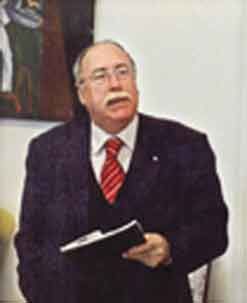The Bolognese people did not wait until the Risorgimento
to unite with the "brothers of Italy" in order to free themselves from
foreigners. From the first joyful welcome of General Napoleon Bonaparte I
(1796) and in the following one as Emperor (1805) in a Bologna prepared
for celebrations with its streets lit by a culture of a thousand years,
the Bolognese people already felt like the protagonists of a new reforming
era. A new spirit was being recognized in the second city of the Papal
State as well as strong indications of the emergence of a new national
Italian conscience.
In San Petronio, the Bolognese population voted on
the 4th of December 1796 for the constitution of the Cispadane Republic,
the first one in Italy to be voted by the people. A true example of
ancient communal freedom coming together with the new principles of the
French revolution.
This Bolognese constitution, which was never
implemented, marked the birth of the Federation (Bologna, Ferrara, Modena
and Reggio) breaking with traditional divisions and hostility. A principle
to increase the common aspirations of liberation and impart the Emelian
land and that of Romagna its own identity. It was a matter of pulling down
the secular fences and acquiring a unity of intentions and belonging and
Bologna became an element of cohesion and stability.
"In the October
11th, 1796 issue of the paper Il Monitore, in an anonymous article
concerning the government of Italy three basic points were made: 1°) Italy
has to be a true nation and unanimous; 2°) it has to be democratic and
egalitarian; 3°) it has to be unopposed to religion. In synthesis, this
was the way of thinking of the Bolognese patriots. Bologna became the
heart of nationality". (1)
The risings of '31 and '48 marked new
conquests and the Bolognese people on the historic day of August 8th, 1848
expelled the Austrians from Bologna in a spontaneous insurrection of the
whole population.
A victory that for a short time had the Bolognese
dreaming and thinking that they were no longer subjugated and dominated by
the foreign enemy and by the Papal State, by that time trying to preserve
ancient privileges and abuse of power. The death of Ugo Bassi on August
8th, 1849 stifled the popular enthusiasm initiated in 1846.
Giovanni
Natali recalling this sad epilogue wrote that Ugo Bassi sanctioned with
his own blood the sacrifices sustained by the population of Bologna to
achieve their right to freedom and independence.
In the years that
followed until the end of 1859, the propaganda and actions of conservative
Catholics were unvarying reasons to fight the liberal and national idea
that never died down in the mind of Bolognese.

It must be remembered that this obstinate intention gave
rise to a particular experience: the birth of a weekly Catholic
publication "L'Osservatore Bolognese", published from April 9th,
1858.
A weekly publication on politics, a unique example in the Papal
State whose intentions were to "preserve" the temporal power of the Pope
and to obstruct, with a certain animosity, liberal ideas and national
thinking. The actions of Cardinal Viale-Prelà contributed to the beginning
of a true campaign with the dissemination of publications on the
risorgimento, which maintained the uselessness of matters relating to the
common people while it was fundamental to learn the "divine truth" since
"we are weak and we live in a country shrouded in the shadow of death, to
be strong we must pray".
The year 1859 was the year of a new radiant
season, in fact of a true resurrection. On June 12th of that year, the
temporal power of the Church was coming to an end and the weekly
"L'Osservatore Bolognese" was immediately cancelled by the new government
council.
The Austrians were also expelled and they abandoned the city
of Bologna for good.
After the 12th of June, 1859, the Pope
excommunicated Bologna and the other rebellious cities for the
"unrighteous conspiracy" and the "wicked deed" against the temporal power
of the Church. (2)
1) Il 1859-60 a Bologna, Edizioni Calderini, 1961.
2)
Almanacco del Centenario 1859-1959, Ed. "Due Torri", 1959.